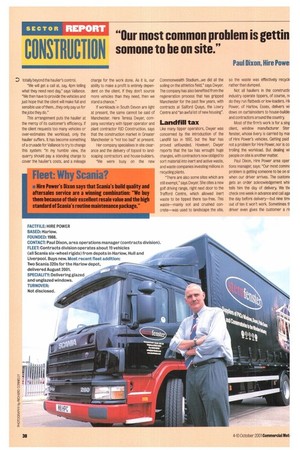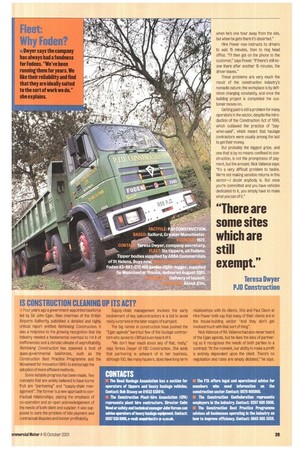"Our most common problem is gettin somone to be on site."
Page 38

Page 39

If you've noticed an error in this article please click here to report it so we can fix it.
Paul Dixon, Hire Powe
0 totally beyond the haiiiier's controi.
"We will get a call at, say, 4pm telling what they need next day," says Valiance. "We then have to provide the vehicles and just hope that the client will make full and sensible use of them...they only pay us for the jobs they do."
This arrangement puts the haulier at the mercy of its customer's efficiency. If the client requests too many vehicles or aver-estimates the workload, only the haulier suffers. It has become something of a crusade for Valiance to try to change this system: "In my humble view, the quarry should pay a standing charge to cover the haulier's costs, and a mileage
charge for the work done. As it is, our ability to make a profit is entirely dependent on the client. if they don't source more vehicles than they need, then we stand a chance."
If workloads in South Devon are light at present, the same cannot be said of Manchester. Here Teresa Dwyer, corni pany secretary with tipper operator and plant contractor PJD Construction, says that the construction market in Greater Manchester is "not too bad" at present.
Her company specialises in site clearance and the delivery of topsoil to landscaping contractors and house-builders.
"We were busy on the new Commonwealth Stadium...we did all the soiling on the athletics field," says Dwyer. The company has also benefited from the regeneration process that has gripped Manchester for the past few years, with contracts at Salford Quays, the Lowry Centre and "an awful lot of new housing".
Landfill tax
Like many tipper operators. Dwyer was concerned by the introduction of the Landfill tax in 1997, but the fear has proved unfounded. However, Dwyer reports that the tax has wrought huge changes, with contractors now obliged to sort material into inert and active waste, and waste companies investing millions in recycling plants.
"There are also some sites which are still exempt," says Dwyer. She cites a new goff driving range, right next door to the Trafford Centre, which allowed inert waste to be tipped there tax-free. This waste—mainly soil and crushed concrete—was used to landscape the site, so the waste was effectively recycl€ rather than dumped.
Not all hauliers in the construct( industry operate tippers, of course, rk do they run flatbeds or low-loaders. Hip Power, of Harlow, Essex, delivers wi dews on curtainsiders to house-buildel and contractors around the country
Most of the firm's work is for a sing client, window manufacturer Ster fenster, whose livery is carried by mai of Hire Power's vehicles. Getting paid not a problem for Hire Power, nor is co trolling the workload. But dealing wi people on site is another matter.
Paul Dixon, Hire Power area oper tions manager, says: Our most comm problem is getting someone to he on si when our driver arrives. The customi gets an order acknowledgement whit tells him the day of delivery. We ME check one week in advance and call aga the day before olei'iveni—but nine timi out of ten it won't work. Sometimes ti driver even gives the customer a rir
when he's one hour away from the site, but when he gets there it's deserted."
Hire Power now instructs its drivers to wait 15 minutes, then to ring head office. "I'll then get on the phone to the customer," says Power. if there's still noone there after another 15 minutes, the driver leaves."
These problems are very much the result of the construction industry's nomadic nature; the workplace is by definition changing constantly, and once the building project is completed the customer moves on.
Getting paid is still a problem for many operators in the sector, despite the introduction of the Construction Act of 1996, which outlawed the practice of "paywhen-paid", which meant that haulage contractors were usually among the last to get their money.
But probably the biggest gripe, and one that is by no means confined to construction, is not the promptness of payment, but the amount. Nick Valiance says: "Its a very difficult problem to tackle. We're not making sensible returns in this sector—I doubt anybody is. But once you're committed and you have vehicles dedicated to it, you simply have to make what you can of it."
IS CONSTRUCTION CLEANING UP ITS ACT?
Four years ago a government-appointed taskforce led by Sir John Egan, then chairman of the British Airports Authority, published a detailed and highly critical report entitled Rethinking Construction, It was a response to the growing recognition that the industry needed a fundamental overhaul to rid it of inefficiencies and a chronic climate of unprofitability. Rethinking Construction has spawned a host of quasi-governmental taskforces, such as the Construction Best Practice Programme and the Movement for Innovation (M4i) to encourage the adoption of more efficient methods.
Some notable progress has been made. Two concepts that are widely believed to have borne fruit are "partnering" and "supply-chain management". The former is a new approach to contractual relationships, placing the emphasis of co-operation and an open acknowledgement of the needs of both client and supplier. It was supposed to cure the problem of late payment and contractual disputes and bolster profitability. Supply-chain management involves the early involvement of key subcontractors in a bid to avoid nasty surprises in the later stages of a project.
The big names in construction have pushed the "Egan agenda" hard but few of the haulage contractors who spoke to CM had even heard of it.
"We don't hear much about any of that, really," says Teresa Dwyer of PJD Construction. She adds that partnering is unheard of in her business, although PJD, like many hauliers, does have long-term relationships with its clients. She and Paul Dixon at Hire Power both say that many of their clients are in the house-building sector "and they don't get involved much with that sort of thing".
Nick Valiance of WL Valiance had also never heard of the Egan agenda, but he likes the idea of partnering as it recognises the needs of both parties to a contract: i'At the moment, our ability to make a profit is entirely dependent upon the client. There's no negotiation and rates are simply dictated," he says.
















































































































































